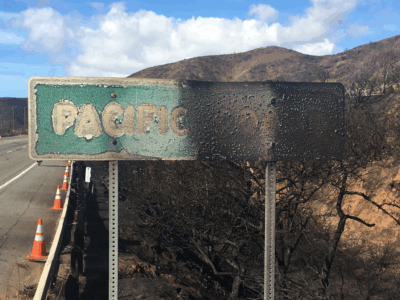Advancing Park Equity in Los Angeles
Investing in urban green space can improve public health and environmental conditions in Los Angeles’ underserved communities, while strengthening the environmental movement by inspiring people to become environmental stewards.
UCLA Law launched its first-ever Public Service Challenge this week, and the Emmett Institute is sponsoring two of the Challenge’s projects: a local garden cleanup with the Los Angeles Neighborhood Land Trust and phone banking with the Environmental Voter Project. Both projects provide the UCLA Law Community with the opportunity to support organizations that are fighting for a more sustainable future—both locally and nationally.
Access to green space produces a host of public health and environmental benefits. Parks provide much-needed spaces for recreation and physical activity in LA’s dense urban areas while mitigating the heat island effect, which causes temperatures in heavily paved neighborhoods to rise faster. Community gardens give residents living in food deserts the opportunity to grow their own fresh produce. Residents gather in green space, supporting social connections and community-building. Studies have shown neighborhoods that have parks and gardens have better physical and mental health outcomes, and communities that lack green space have higher rates of obesity, diabetes, heart disease, and premature death.
Urban green space also promotes environmental stewardship and is key to the success of the environmental movement. Many low-income and BIPOC Angelenos are unable to enjoy LA’s beaches, mountains, and trails due to transportation and financial barriers or because these settings are unfamiliar, and often unwelcoming. Creating and improving access to welcoming, public green space in urban areas allows community members to connect with and care for nature. This connection—a firsthand experience of the benefits of a clean, safe environment—is often the basis for increased support for environmental causes.
But many parts of both the City and County of Los Angeles are “park-poor,” meaning there is no public green space within a half-mile of residences.
According to the Trust for Public Land’s Parkscore, which ranks major cities based on park access, acreage, amenities, and investments, the City of Los Angeles ranks 49th out of 100. More than 1.5 million Angelenos do not live within a 10-minute walk to a park, and even those who do often lack access to safe, high-quality green spaces. Many of the communities that lack green space are also burdened by higher levels of pollution and food insecurity.
Park inequities extend throughout Los Angeles County, where approximately 50% of residents live in neighborhoods with high or very high park need. High need areas have less than 1.6 acres of park space per 1,000 residents and very high need areas have less than 0.7 acres of park space, as compared to the County’s median of 3.3 acres per 1,000 people. Residents of park-poor neighborhoods are predominantly low-income, people of color, which makes the fight for park equity a fight for racial equity.
Greening Los Angeles is a heavy lift. High property values and the urgent need for more affordable housing make it difficult to acquire land for new parks. But local nonprofit organizations are piloting innovative strategies to increase park access without displacing local residents. From joint development projects that co-locate parks and affordable housing on the same site to brownfield redevelopment projects that turn polluted sites into new public green spaces, there are a number of ways to increase park acreage in Los Angeles. Initiatives like UCLA’s Public Service Challenge are also a way to increase awareness of the substantial need for public green spaces and to support local greening efforts.







Reader Comments